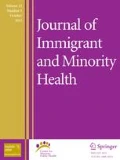Abstract
It is not known how discrimination might affect diabetes-related distress (DRD), an important correlate of diabetes outcomes. We examined correlates of discrimination and the influence of discrimination on DRD and depressive symptoms (DS) for African Americans and Latinos with type 2 diabetes. We analyzed survey data (n = 157) collected at enrollment into a diabetes management intervention. Using multiple linear regression, we examined correlates of discrimination and the association between discrimination and DRD and DS. Discrimination was significantly associated with higher DRD for Latinos (b 1.58, 95 % CI 1.08, 2.31, p < 0.05), but not significant for African Americans (b 0.96, 95 % CI 0.59, 1.57). Discrimination was marginally significantly associated with more DS for Latinos (b 1.43, 95 % CI 0.97, 2.12, p < 0.10), but not significant for African Americans (b 1.21, 95 % CI 0.87, 1.70). These findings suggest the need to address stressors unique to racial/ethnic minorities to improve diabetes-related outcomes.
Similar content being viewed by others
References
Gee GC, Ryan A, Laflamme DJ, Holt J. Self-reported discrimination and mental health status among African descendents, Mexican Americans, and other Latinos in the New Hampshire REACH 2010 initiative: the added dimension of immigration. Am J Public Health. 2006;96:1821–8.
Williams DR, Mohammed SA. Discrimination and racial disparities in health: evidence and needed research. J Behav Med. 2009;32:20–47.
Williams DR, Neighbors HW, Jackson JS. Racial/ethnic discrimination and health: findings from community studies. Am J Public Health. 2003;93:200–8.
Cowie CC, Rust KF, Byrd-Holt DD, Eberhardt MS, Flegal KM, Engelgau MM, et al. Prevalence of diabetes and impaired fasting glucose in adults in the U.S. population: National Health and Nutrition Examination Survey 1999–2002. Diabetes Care. 2006;29(6):1263–8.
Kirk JK, Passmore LV, Bell RA, Narayan KMV, D’Agostino RB, Arcury TA, et al. Disparities in A1C levels between Hispanic and non-Hispanic White adults with diabetes. Diabetes Care. 2008;31:240–6.
Kirk JK, D’Agostino RB, Bell RA, Passmore LV, Bonds DE, Karter AJ, et al. Disparities in HbA1c levels between African-American and non-Hispanic White adults with diabetes. Diabetes Care. 2006;29:2130–6.
Heisler M, Faul JD, Hayward RA, Langa KM, Blaum C, Weir D. Mechanisms for racial and ethnic disparities in glycemic control in middle-aged and older Americans in the Health and Retirement Study. Arch Intern Med. 2007;167(17):1853–60.
Miech RA, Kim J, McConnell C, Hamman RF. A growing disparity in diabetes-related mortality: U.S. trends, 1989–2005. Am J Prev Med. 2009;36:2.
Ryan AM, Gee GC, Griffith D. The effects of perceived discrimination on diabetes management. J Health Care Poor Underserved. 2008;19:149–63.
Hunte HER, Williams DR. The association between perceived discrimination and obesity in a population-based multiracial and multiethnic adult sample. Am J Public Health. 2009;99(7):1285–92.
Finch BK, Kology B, Vega WA. Perceived discrimination and depression among Mexican-Origin Adults in California. J Health Soc Behav. 2000;41(3):295–313.
Lee M-A, Ferraro KF. Perceived discrimination and health among Puerto Rican and Mexican Americans: buffering effect of the Lazo matrimonial? Soc Sci Med. 2009;68:1966–74.
Schulz AJ, Gravlee CC, Williams DR, Israel BA, Mentz G, Rowe Z. Discrimination, symptoms of depression, and self-rated health among African American women in Detroit: results from a longitudinal analysis. Am J Public Health. 2006;96:1265–70.
Kessler RC, Mickelson KD, Williams DR. The prevalence, distribution, and mental health correlates of perceived discrimination in the United States. J Health Soc Behav. 1999;40(3):208–30.
Borrell LN, Kiefe CI, Williams DR, Diez-Roux AV, Gordon-Larsen P. Self-reported health, perceived racial discrimination, and skin color in African Americans in the CARDIA study. Soc Sci Med. 2006;63:1415–27.
Sims M, Diez-Roux AV, Dudley A, Gebreab S, Wyatt S, Bruce MA, et al. Perceived discrimination and hypertension among African Americans in the Jackson Heart Study. Am J Public Health. 2012;102:S258–65.
Perez DJ, Fortuna L, Alegria M. Prevalence and correlates of everyday discrimination among U.S. Latinos. J Commun Psychol. 2008;36(4):421–33.
Kulis S, Marsiglia FF, Nieri T. Perceived ethnic discrimination versus acculturation stress: influences on substances use among Latino youth in the Southwest. J Health Soc Behav. 2009;50(4):443–59.
Flores E, Tschann JM, Dimas JM, Bachen EA, Pasch LA, de Groat CL. Perceived discrimination, perceived stress, and mental and physical health among Mexican-Origin adults. Hispanic J Behav Sci. 2008;30:401–24.
Vega WA, Rodriguez MA, Gruskin E. Health disparities in the Latino population. Epidemiol Rev. 2009;31:99–112.
Griffith DM, Johnson J, Ellis KR, Schulz AJ. Cultural context and a critical approach to eliminating health disparities. Ethn Dis. 2010;20:71–6.
Geronimus AT. To mitigate, resist, or undo: addressing structural influences on the health of urban populations. Am J Public Health. 2000;90:867–72.
Sellers SL, Neighbors HW. Effects of goal-striving stress on the mental health of Black Americans. J Health Soc Behav. 2008;49:92–103.
Moradi B, Risco C. Perceived discrimination experiences and mental health of Latina/o American persons. J Couns Psychol. 2006;53(4):411–21.
Ciechanowski PS, Katon WJ, Russon JE. Depression and diabetes: impact of depressive symptoms on adherence, function, and costs. Arch Intern Med. 2000;160:3278–85.
Fisher L, Skaff MM, Mullan JT, Arean P, Moher D, Masharani U, et al. Clinical depression versus distress among patients with type 2 diabetes. Diabetes Care. 2007;30:542–8.
Polonsky W, Anderson B, Lohrer P, Welch G, Jacobson A, Aponte J, et al. Assessment of diabetes-related distress. Diabetes Care. 1995;18(6):754–60.
Fisher L, Mullan JT, Arean P, Glasgow RE, Hessler D, Masharani U. Diabetes distress but not clinical depression or depressive symptoms is associated with glycemic control in both cross-sectional and longitudinal analyses. Diabetes Care. 2010;33(1):23–8.
Fisher L, Skaff MM, Mullan JT, Arean PA, Glasgow R, Masharani U. A longitudinal study of affective and anxiety disorders, depressive affect, and diabetes distress in adults with type 2 diabetes. Diabetes Med. 2008;25:1096–101.
Mendenhall E. Syndemic suffering: social distress, depression, and diabetes among Mexican immigrant women. Walnut Creek, CA: Left Coast Press, Inc.; 2012.
Fisher L, Glasgow RE, Strycker LA. The relationship between diabetes distress and clinical depression with glycemic control among patients with type 2 diabetes. Diabetes Care. 2010;33:1034–6.
Williams DR, Yu Y, Jackson JS, Anderson NB. Racial differences in physical and mental health: socio-economic status, stress and discrimination. J Health Psychol. 1997;2(3):335–51.
Moody-Ayers SY, Stewart AL, Covinsky KE, Inouye SK. Prevalence and correlates of perceived societal racism in older African-American adults with type 2 diabetes mellitus. J Am Geriatr Soc. 2005;53:2202–8.
Rees CA, Karter AJ, Young BA, Spigner C, Grembowski D, Schillinger D, et al. Correlates of patient-reported racial/ethnic health care discrimination in the diabetes study of Northern California. J Health Care Poor Underserved. 2011;22(1):211–25.
Spencer MS, Rosland A-M, Kieffer EC, Sinco BR, Valerio M, Palmisano G, et al. Effectiveness of a community health worker intervention among African American and Latino adults with type 2 diabetes: a randomized controlled trial. Am J Public Health 2011;101(12):2253–60.
Two Feathers J, Kieffer EC, Palmisano G, Anderson M, Sinco B, Janz N, et al. Racial and ethnic approaches to community health (REACH) Detroit partnership: improving diabetes-related outcomes among African American and Latino adults. Am J Public Health. 2005;95(9):1552–60.
Detroit DD. Census summary file for Osborn, Skillman Good Neighborhood, 2000 and 2010. Detroit, MI: Data Driven Detroit; 2011.
Data WSUDK. Detroit kids data district profiles. Detroit: Wayne State University Detroit Kids Data; 2007.
Detroit DD. Census summary file of Southwest, Skillman Good Neighborhood, 2000 and 2010. Detroit, MI: Data Driven Detroit; 2011.
Huang FY, Chung H, Kroenke K, Delucchi KL, Spitzer RL. Using the Patient Health Questionnaire-9 to measure depression among racially and ethnically diverse primary care patients. J Gen Intern Med. 2006;21:547–52.
Toobert DJ, Hampson SE, Glasgow RE. The summary of diabetes self-care activities measure: results from 7 studies and a revised scale. Diabetes Care. 2000;23:943–50.
Viruell-Fuentes EA. Beyond acculturation: immigration, discrimination, and health research among Mexicans in the United States. Soc Sci Med. 2007;65:1524–35.
Viruell-Fuentes EA. “It’s a Lot of Work”: racialization processes, ethnic identity formations, and their health implications. Du Bois Rev. 2011;8(1):37–52.
Viruell-Fuentes EA, Schulz AJ. Toward a dynamic conceptualization of social ties and context: implications for understanding immigrant and Latino health. Am J Public Health. 2009;99:2167–75.
Spencer MS, Kieffer EC, Sinco BR, Palmisano G, Guzman JR, James SA, et al. Diabetes-specific emotional distress among African Americans and Hispanics with type 2 diabetes. J Health Care Poor Underserved. 2006;17:88–105.
Slean GR, Jacobs EA, Lahiff M, Fisher L, Fernandez A. Aspects of culturally competent care are associated with less emotional burden among patients with diabetes. Med Care. 2012;50:S69–73.
Franzini L, Ribble JC, Keddie AM. Understanding the Hispanic paradox. Ethn Dis. 2001;11:496–518.
Kieffer EC, Willis SK, Odoms-Young AM, Guzman R, Allen AJ, Two Feathers J, et al. Reducing disparities in diabetes Among African-American and Latino residents of Detroit: the essential role of Community Planning Focus Groups. Ethn Dis. 2004;14(Supplement 1):S1-27–37.
Fisher L, Mullan JT, Skaff MM, Glasgow RE, Arean P, Hessler D. Predicting diabetes distress in patients with type 2 diabetes: a longitudinal study. Diabetes Med. 2009;26:622–7.
Two Feathers J, Kieffer EC, Palmisano G, Anderson M, Janz N, Spencer MS, et al. The development, implementation, and process evaluation of the REACH Detroit partnership’s diabetes lifestyle intervention. The Diabetes Educator. 2007;33(3):509–20.
Williams D, Costa MV, Odunlami AO, Mohammed SA. Moving upstream: How interventions that address the social determinants of health can improve health and reduce disparities. J Public Health Manag Pract. 2008;14(Supplement):S8–S17.
Hacker K, Chu J, Leung C, Marra R, Pirie A, Brahimi M, et al. The impact of immigration and customs enforcement on immigrant health: perceptions of immigrants in Everett, Massachusetts, USA. Soc Sci Med. 2011;73:586–94.
Acknowledgments
This research was supported by the National Institute of Diabetes and Digestive and Kidney Disease (R18DK0785501A1: Spencer, P.I.), Centers for Disease Control and Prevention (Cooperative Agreement No. U50/CCU417409), the Michigan Diabetes Research and Training Center (NIH Grant 5P60-DK20572), the Robert Wood Johnson Foundation Clinical Scholars Program, and the Promoting Ethnic Diversity in Public Health Training Grant (R25-GM-058641). We thank the Community Health and Social Services (CHASS) and REACH Detroit Partnership staff, the REACH Detroit Partnership Steering Committee (available at: http://www.reachdetroit.org), and the REACH Detroit Family Intervention participants for their involvement in this study. The REACH Detroit Partnership is affiliated with the Detroit Community-Academic Urban Research Center (available at: http://www.sph.umich.edu/URC).
Author information
Authors and Affiliations
Corresponding author
Rights and permissions
About this article
Cite this article
LeBron, A.M.W., Valerio, M.A., Kieffer, E. et al. Everyday Discrimination, Diabetes-Related Distress, and Depressive Symptoms Among African Americans and Latinos with Diabetes. J Immigrant Minority Health 16, 1208–1216 (2014). https://doi.org/10.1007/s10903-013-9843-3
Published:
Issue Date:
DOI: https://doi.org/10.1007/s10903-013-9843-3




